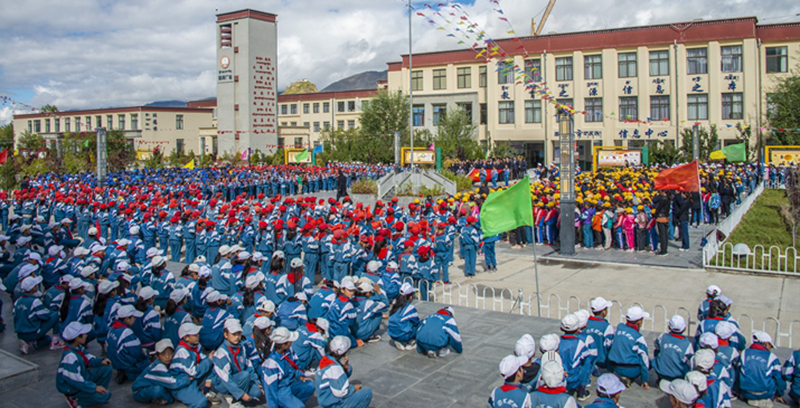Dharamshala, India – The Chinese authorities intensified their efforts to inculcate "Chinese communist ideology" into Tibetan children in a model kindergarten in Lhasa, the capital of Tibet. The kindergarten, which caters for children under the age of five, is said to have been designed to ensure that the concept of "Chinese communist ideology" is " penetrated into the blood and souls of children".
The "national unity education" program, which has drawn attention and concern both in China and abroad, is part of a wider Chinese strategy to "promote unity and loyalty" to the Chinese state among minority groups, particularly in regions such as Tibet.
According to the Chinese state media reports, the model kindergarten in Lhasa is now serving as a pilot project for this education initiative. The curriculum reportedly includes lessons that highlight the importance of "national unity", Chinese culture, and the ideology of the Chinese Communist Party (CCP). Children are being taught about the history and achievements of the CCP, with an emphasis on fostering a sense of "patriotism and loyalty" towards China.
China, for its part, defends the initiative as an important step towards promoting "harmony" and "stability" in the region. The authorities claim that instilling a sense of "national unity" from an early age is vital to Tibet's long-term "development and progress", as well as its integration into wider Chinese society. However, this threatens the integrity of authentic, self-determined Tibetan culture and language in the younger generation of Tibetans.
Recently, 40 Tibetan children from the Yushu Children's Welfare Centre were taken to Beijing from May 30 to June 3 as part of a "research trip to motherland" coincided with China's Children's Day on June 1. The Yushu Prefectural People's Government, Beijing Aid to Youth Headquarters, and China News Service collaborated to organise the event, which state-affiliated media described as the first action of the "Dream Realization Project". China News Network President Yu Lan described the journey as an effort to "experience the community of the Chinese nation" and a study tour with the focus on "motherland". These actions of the Chinese administration are rather insidious and aim on separating Tibetan kids from their culture and identity.
General Secretary Xi Jinping's message for the event was echoed by Pan Yue, Minister of the National Ethnic Affairs Commission and Deputy Head of the United Front Work Department, who gave a history lesson to the kids while urging them to uphold the "love of the party and the nation".
The CCP's efforts to "sinicize" Tibetan culture and bring it under its control go hand in hand with China's determination to brainwash Tibetan children by teaching them Chinese culture, language and history, as well as CCP ideology, from an early age in Chinese colonial boarding schools. These efforts are not concentrated in the so-called Tibet Autonomous Region (TAR), but also in the many regions of Tibet.
In order to create "model zones for national unity and progress" in the Tibet Autonomous Region, new laws were established by the 11th People's Congress of the TAR in January 2020. The laws grant the government the authority to impose a Han-centric way of life and to raise "patriotic and watchful citizens as party informants". At the Central Conference on Ethnic Affairs in Beijing in August 2021, Xi Jinping declared, "All ethnic groups should be guided to always place the interests of the Chinese nation above anything else, with their consciousness of different ethnic groups serving the sense of community for the Chinese nation as a whole," imposing "the idea of One nation, One language, One identity."
The Jiangsu Experimental Kindergarten has been providing instruction intended at forming the "consciousness of the Chinese nation community" to a large percentage of Tibetan pupils enrolled in its classes in Tibet's capital city of Lhasa. It appears that the kindergarten is a part of a larger organisation that also provides junior and senior high school education. According to the kindergarten's director, Dong Shiwen, the school has long viewed fostering "national unity education" as the only initiative for fostering the next generation and has taken numerous steps to carry out its stated mission of "educating people for the party and talents for the country."
The kindergarten's director emphasised that the teaching approach there enables the idea of "national unity" to "penetrate the blood and soul." Children in Tibet are forced to perform patriotic songs from the 1990s like "Love my China," which boasts that "56 ethnic groups, 56 flowers, and 56 siblings are family." According to a 2016 assessment by the Tibetan Centre for Human Rights and Democracy, 90% of the students are Tibetan.
With the forced closure of Tibetan schools and the forced placement of Tibetan children in Chinese colonial boarding schools, the replacement of Tibetan teachers with state-trained Chinese teachers further reduces Tibetan children's ability to learn their mother tongue and communicate with their elders, thus depriving them of their identity.


![Tibet has a rich history as a sovereign nation until the 1950s when it was invaded by China. [Photo: File]](/images/stories/Pics-2024/March/Tibet-Nation-1940s.jpg#joomlaImage://local-images/stories/Pics-2024/March/Tibet-Nation-1940s.jpg?width=1489&height=878)


















